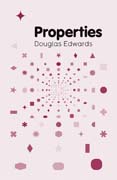
The world is populated with many different objects, to which we often attribute properties: we say, for example, that grass is green, that the earth is spherical, that humans are animals, and that murder is wrong. We also take it that these properties are things in their own right: there is something in which being green, or spherical, or an animal, or wrong, consists, and that certain scientific or normative projects are engaged in uncovering the essences of such properties. In light of this, an important question arises: what kind of things should we take properties themselves to be? In Properties , Douglas Edwards gives an engaging, accessible, and up–to–date introduction to the many theories of properties available. Edwards charts the central positions in the debate over properties, including the views that properties are universals, that properties are constructed from tropes, and that properties are classes of objects, and assesses the benefits and disadvantages of each. Attempts to deny the existence of properties are also considered, along with ‘pluralist’ proposals, which aim to accommodate the different kinds of properties that are found in various philosophical debates. Properties is the ideal introduction to this topic and will be an invaluable resource for scholars and students wishing to learn more about the important roles that properties have played, and continue to play, in contemporary philosophy. INDICE: Acknowledgements Introduction Chapter 1: Introducing Properties 1.1 Why Think That There Are Properties? 1.2 What is a Theory of Properties? 1.3 A Methodological Strategy 1.4 The Jobs Properties Do 1.5 Definitions and Terminological Notes 1.6 Further Reading Chapter 2: Properties as Universals 2.1 Introduction 2.2. Transcendental Universals. 2.3. Immanent Universals 2.4. Further Reading Chapter 3: Tropes 3.1 Introduction 3.2 The Basic Idea 3.3 Tropes and Causation 3.4 Properties as Sets of Tropes 3.6 The Relation between Objects and Tropes 3.7 Accounting for Resemblance between Tropes 3.8 Tropes and Universals 3.9 Further Reading Chapter 4: Properties Eliminated? 4.1 Introduction 4.2 Russell and Quine on Ontological Commitment 4.3 Ostrich Nominalism 4.4 Primitive Predication 4.5 Paraphrase 4.6 Objects and Properties 4.7 Revised One Over Many 4.8 Implications for Ostrich Nominalism 4.9 Implications for Universals and Tropes 4.10 Further Reading Chapter 5: Varieties of Nominalism 5.1 Introduction 5.2 Predicate and Concept Nominalism 5.3 Class Nominalism 5.4 Mereological Nominalism 5.5 Resemblance Nominalism 5.6 Chapter Summary 5.7 Further Reading Chapter 6: Pluralist Views of Properties 6.1 Introduction 6.2 The Distinction between Abundant and Natural Properties 6.3 Grounding the Distinction: Universals, Tropes, and Primitive Naturalness 6.4 Degrees of Naturalness: Supervenience, Definability, Grounding 6.5 Universals, Tropes, and Degrees of Naturalness 6.6 Graded vs Egalitarian Conceptions of Naturalness 6.7 Summary 6.8 Further Reading Chapter 7: Kinds of Properties 7.1 Introduction 7.2 Methodology: Descriptive and Prescriptive Metaphysics 7.3 Mathematical Properties 7.4 Mental Properties 7.5 Moral Properties 7.6 Summary 7.7 Further Reading Conclusion Notes References
- ISBN: 978-0-7456-6175-9
- Editorial: Polity Press
- Encuadernacion: Rústica
- Páginas: 160
- Fecha Publicación: 02/05/2014
- Nº Volúmenes: 1
- Idioma: Inglés
